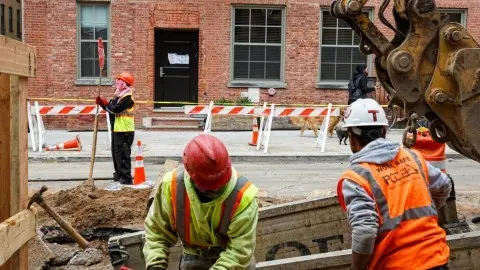Germany: It’s a ‘GroKo’
More than five months after the elections, Germany will finally get a new government. It will be the old one. A grand coalition, in Germany also known as the 'GroKo'
The SPD party members voted for another grand coalition with Angela Merkel's Christian Democrats, allowing her to stay on as chancellor for a fourth term. In the end, 66% of SPD member votes were in favour of the grand coalition; this was much bigger in numbers than expected.
On 14 March, the German parliament will vote on the next chancellor. With the SPD vote, 14 March will only be a formality. After more than five months, Germany will get a new government - one that basically will deliver more of the same as in the last four years. The government is expected to bring fiscal stimulus, investment in education and digitalisation, some tax relief and steps to tackle social inequality. This new government will, in our view, also cautiously and slowly push forward with European and Eurozone integration; no bold steps. For us, the most exciting project is in the intended economic and tax harmonisation between France and Germany.
Everyone wins, but not necessarily the SPD
At least in the short run, the SPD vote should bring some stability to Germany and Europe. Even though we are very hesitant to call this an upcoming breakthrough for Europe and the Eurozone, the new government will clearly be supportive of further integration. The question will obviously be how far this integration will go. Chances are high that it will remain an integration process of very small steps.
For German politics, Angela Merkel and the CDU will now have time to restructure the party and to build up a new generation for the post-Merkel era. At the same time, one exciting question will be whether the AfD - as populist parties in so many other European countries - can benefit from its role as the biggest opposition party. Earlier experiences in other countries have shown that grand coalitions over a longer time period can strengthen populist parties, both on the left and right wing of the political spectrum. The biggest challenge, however, will come for the SPD. The party vote and the preceding discussion have shown that it is a party under severe stress and conflicting views. Party renewal while being part of government is a very challenging task, to say the least. Germany and Europe now look somewhat reassured in the near-term future. The SPD, not necessarily so.
This publication has been prepared by ING solely for information purposes irrespective of a particular user's means, financial situation or investment objectives. The information does not constitute investment recommendation, and nor is it investment, legal or tax advice or an offer or solicitation to purchase or sell any financial instrument. Read more
Download
Download snap
4 March 2018
Week in Review: Economics trumps politics This bundle contains 5 Articles